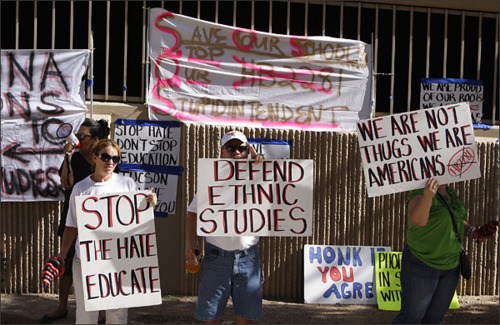
By Bill Bigelow
You may have seen that an administrative law judge in Arizona, Lewis Kowal, just upheld the decree by the State Superintendent of Public Instruction that Tucson’s Mexican American Studies program violates state law. Judge Kowal found that the Tucson program was teaching Latino history and culture “in a biased, political, and emotionally charged manner.” According to CNN, one lesson that the judge objected to taught that the historic treatment of Mexican Americans was “marked by the use of force, fraud and exploitation.”
Try this “history detective” experiment. Ask the next person you encounter to tell you what they know about the U.S. war with Mexico. More than likely, this will be a short conversation, because that war (1846-48) merits barely a footnote in U.S. history textbooks. The most recent textbook I was assigned when I taught high school history in Portland, Ore. was American Odyssey. In 250 pages devoted to pre-20th century U.S. history, the book includes exactly two paragraphs on this war. (The district’s new adoption, History Alive! Pursuing American Ideals, doubles the coverage to a whopping four paragraphs.)
And yet this is the war that “gave” — in the words of American Odyssey — California, Nevada, Utah, Arizona, New Mexico, and part of Colorado to the United States of America. And the Treaty of Guadalupe Hidalgo, formally ending the war, ratified the annexation of Texas, which had broken away from Mexico largely because of Mexico’s policies against slavery.
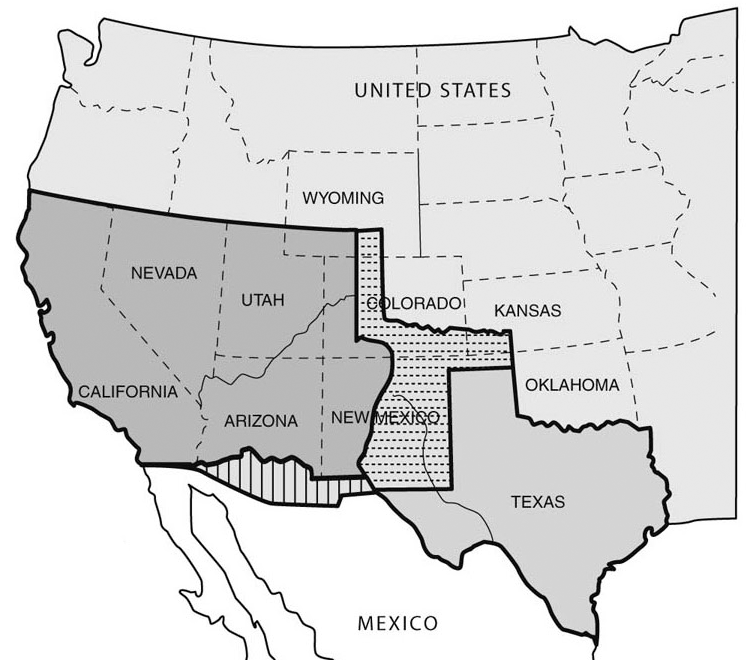 Most Mexicans know that the war against Mexico was another chapter in U.S. imperialism — a “North American invasion,” as it’s commemorated in a huge memorial in Mexico City’s Chapultepec Park. But don’t take Mexicans’ word for it. Here’s what Col. Ethan Allan Hitchcock, aide to the commander of U.S. forces Gen. Zachary Taylor, wrote at the time in his journal about the war’s origins: “I have said from the first that the United States are the aggressors. … We have not one particle of right to be here … It looks as if the government sent a small force on purpose to bring on a war, so as to have a pretext for taking California and as much of this country as it chooses.”
Most Mexicans know that the war against Mexico was another chapter in U.S. imperialism — a “North American invasion,” as it’s commemorated in a huge memorial in Mexico City’s Chapultepec Park. But don’t take Mexicans’ word for it. Here’s what Col. Ethan Allan Hitchcock, aide to the commander of U.S. forces Gen. Zachary Taylor, wrote at the time in his journal about the war’s origins: “I have said from the first that the United States are the aggressors. … We have not one particle of right to be here … It looks as if the government sent a small force on purpose to bring on a war, so as to have a pretext for taking California and as much of this country as it chooses.”
Exactly. President James K. Polk, himself a slaveowner, had ordered U.S. troops into an area claimed by Mexico and inhabited by Mexicans and waited for them to be attacked. And when they were, Polk claimed aggression and the U.S. had its war. The invading U.S. Army actually called itself the Army of Occupation.
The abolition movement regarded the war as a land grab to expand slavery. The great abolitionist Frederick Douglass denounced the Mexican invasion as “a murderous war — as a war against the free states — as a war against freedom, against the Negro, and against the interests of workingmen of this country — and as a means of extending that great evil and damning curse, negro slavery.” Henry David Thoreau coined the term “civil disobedience” in defense of his position that people should not pay taxes to support the war against Mexico. Thoreau argued that a minority can act against an unjust system only when it “clogs by its whole weight.”
Students enrolled in Tucson’s Mexican American Studies program would likely have known this history, because, after all, this is the story of how people living in Tucson no longer live in Mexico. But according to Judge Kowal, the program violates state law. That law bans curriculum that might “promote resentment toward a race or class of people.” And, as mentioned, Kowal complained that the material in Mexican American Studies was presented in “an emotionally charged manner . . .”
I have not seen the full Mexican American Studies curriculum, although I know it includes important texts like Rodolfo Acuña’s classic Occupied America and Paulo Freire’s A Pedagogy of the Oppressed — a book studied in every teacher education program worthy of the name. But I’m wondering how one can teach about the history of the U.S. relationship with Mexico in a manner that is not “emotionally charged.” You want to talk about “bias”? What about the bias of a textbook that can “cover” a war like that waged against Mexico in two paragraphs, or four paragraphs, and fail to so much as quote a Mexican, an abolitionist, a soldier, a woman, an African American, or a Native American — or fail to describe the death or injury of a single human being? What about the bias of a textbook or an entire curriculum that can discuss invasion and war in a manner that is not “emotionally charged”?
 Here’s a U.S. infantry lieutenant who wrote his parents after a U.S. officer named Walker was killed in battle, quoted in Howard Zinn’s A People’s History of the United States: “Gen. Lane . . . told us to ‘avenge the death of the gallant Walker’ . . . Grog shops were broken open first and then, maddened with liquor, every species of outrage was committed. Old women and girls were stripped of their clothing — many suffered still greater outrages. Men were shot by dozens . . . their property, churches, stores, and dwelling houses ransacked . . . It made me for the first time ashamed of my country.” In his memoirs, Ulysses S. Grant wrote that this was “one of the most unjust [wars] ever waged by a stronger against a weaker nation . . .”
Here’s a U.S. infantry lieutenant who wrote his parents after a U.S. officer named Walker was killed in battle, quoted in Howard Zinn’s A People’s History of the United States: “Gen. Lane . . . told us to ‘avenge the death of the gallant Walker’ . . . Grog shops were broken open first and then, maddened with liquor, every species of outrage was committed. Old women and girls were stripped of their clothing — many suffered still greater outrages. Men were shot by dozens . . . their property, churches, stores, and dwelling houses ransacked . . . It made me for the first time ashamed of my country.” In his memoirs, Ulysses S. Grant wrote that this was “one of the most unjust [wars] ever waged by a stronger against a weaker nation . . .”
The problem with the school curriculum in this country is that it is not emotionally charged enough. Poverty rates are skyrocketing — especially for children of color. People are losing their homes because of the criminal behavior of huge financial institutions — and race has a lot to do with who profits and who suffers. This country’s military is still being sent to invade and occupy — and murder people with silent, invisible drones. The rich and powerful poison our atmosphere, our water, our food, and our children. So, yes, let’s have a curriculum that gets emotional — and that tells a fuller truth than is offered in our textbooks. And let’s stand in solidarity with the teachers and students in Tucson who are demanding to teach and learn about things that matter.
Reprinted from the Rethinking Schools Blog, Dec. 29, 2011. © Rethinking Schools.
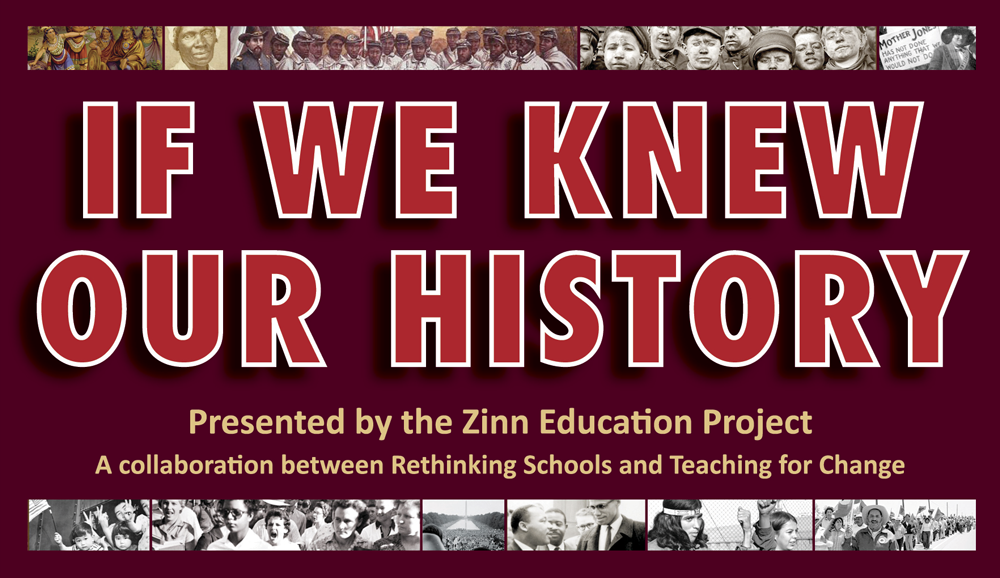 This article is part of the Zinn Education Project’s If We Knew Our History series.
This article is part of the Zinn Education Project’s If We Knew Our History series.
The Zinn Education Project, a project of Rethinking Schools and Teaching for Change.


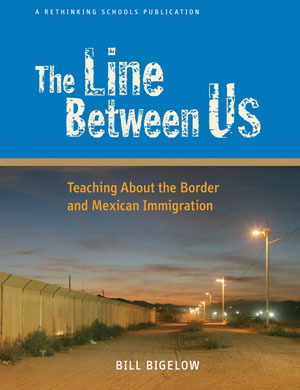
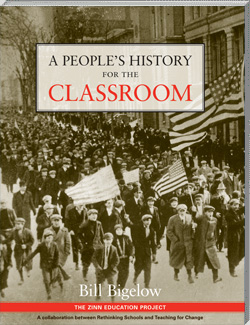





Twitter
Google plus
LinkedIn